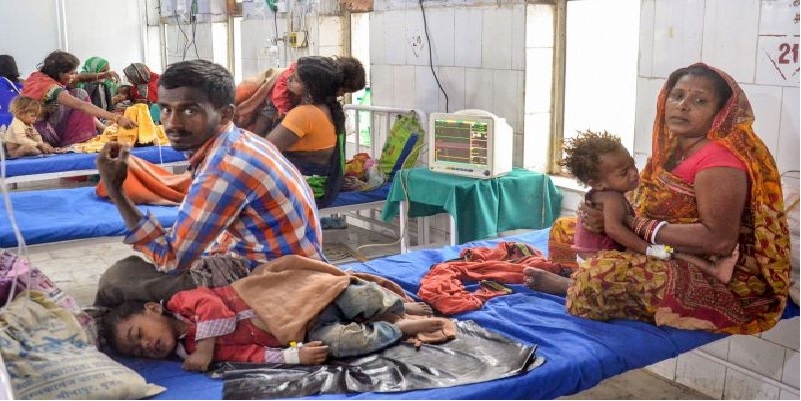Poor healthcare killing kids in Bihar
| Date :15-Jul-2019 |

By SATYAKI CHAKRABORTY
COMMUNIST Party of India national Council Secretary Binoy Viswam, MP, said that the children who died of acute encephalitis syndrome (AES) were in fact unfortunate victims of poverty, malnutrition and poor healthcare facilities. The occurrence of the disease every year taking away the lives of kids, mostly from poor families, speaks of the negligence meted out to the poorer sections of the population by Governments. He pointed out that the highly publicised Ayushman Bharat health cover is a myth. No doubt it is a boon for the insurance companies.
Viswam talked to newsmen including IPA after returning from Bihar’s Muzaffarpur where he had gone and discussed the details of the killer disease with hospital authorities, families of affected kids, local health officials and others. He also visited some of the families who had lost their dear children. He said that he had earlier raised the issue through a calling attention motion in the Rajya Sabha. The CPI leader said that though the official figures put the number of deaths of kids a little more than 150, the actual number of kids who succumbed to the killer disease must be over 500. In this context he was quoting from the answer provided by the Minister of State for Health and Family Welfare Ashwini Kumar Choubey in the Rajya Sabha on June 25 itself to his own unstarred question on rise in cases of TB and other diseases including AES.
The Minister informed: “There is decrease in the number of AES cases reported during 2018 (11,388) in comparison to 2017 (13,672). However, due to multiple etiology and other factors there is no constant decline trend. National Centre for Disease Control (NCDC) along with other research agencies is investigating about the causative agents of AES in the country.” The details of the deaths reported due to acute encephalitis in Bihar in the last three years is 102, 54 and 33 in 2016, 17 and 18 with all India details as 1301, 1097 and 636 respectively. The continuing death of kids in Muzaffarpur district alone this year already crossing 150 and many still in hospitals battling for their lives make one uncomfortable in accepting the Ministry’s claims on number of deaths, the CPI leader observed.
The Ministry said that the Government has adopted measures to control AES which include strengthening and expansion of JE vaccination in affected districts, strengthening of surveillance, vector control, strengthening of case management by setting 10 bedded paediatric ICU in 60 district hospitals and timely referral of serious and complicated cases, access to safe drinking water and proper sanitation facilities to the target population in affected rural and urban areas and provision of adequate facilities for physical, medical, neurological and social rehabilitation as well as improvement of nutritional status of children at risk. However, the ground realities speak of a different dismal picture, said Binoy Viswam.
It is just a matter of coincidence that when the CPI leader was in Muzaffarpur, the Supreme Court came out on the same day with a serious verdict terming the death of more than 150 children in Bihar’s Muzaffarpur due to acute encephalitis syndrome an “extraordinary” situation requiring immediate attention. The apex court sought an explanation from the Centre and the Bihar Government on the steps taken to control the disease. A bench of Justices Sanjiv Khanna and B R Gavai said people had a basic right to medical care, nutrition and hygienic environment, and the death of such a large number of children was unacceptable. The court said it had to be found out why such a situation had occurred and called for a response in seven days. The court asked for a response on three aspects — the availability of public medical care facilities, nutrition, and sanitation and hygiene in the areas affected by the disease.
Muzaffarpur Chief Judicial Magistrate Suryakant Tiwari has ordered a probe into allegations of negligence against Union Health Minister Harsh Vardhan and his Bihar counterpart Mangal Pandey in dealing with AES cases. On a plea, he transferred the case to a special MP-MLA court to take cognisance of the claims and record statements. Though Additional Solicitor General Vikramajit Banerjee told the bench that the Governments were taking all necessary steps to deal with the outbreak of the disease and claimed the situation is “absolutely under control”, the bench decided to examine the issue in the light of the outbreak becoming an annual phenomenon. The petition, filed by advocate Manohar Pratap, sought a direction to the Centre for providing all necessary medical equipment for the effective treatment of children suffering from the disease.
He sought the Supreme Court’s direction to the Centre and the State Government to immediately arrange 500 intensive care units with the required medical professionals to deal with the emergent situation due to the outbreak of the disease. The petitioner said the deaths were a direct result of negligence and inaction on the part of the UP and Bihar Governments and Centre’s handling of the epidemic situation which arises every year. A separate petition, filed by advocate Shiv Kumar Tripathi, alleged that more than 1,000 children have lost their lives due to AES in Muzaffarpur itself in the last one decade.
In the same vein as the apex court, the Patna High Court also expressed on the same day concern over the lack of infrastructure in Government hospitals in Bihar. While hearing a PIL filed by Vikas Chandra alias Guddu Baba, the single bench of Justice Jyoti Saran was also surprised to know that posts of pharmacists were lying vacant in premier hospitals. He warned the Principal Secretary (health) against non-compliance of an earlier directive and said he would be fined Rs 50,000 if he failed to adhere to the order. (IPA)